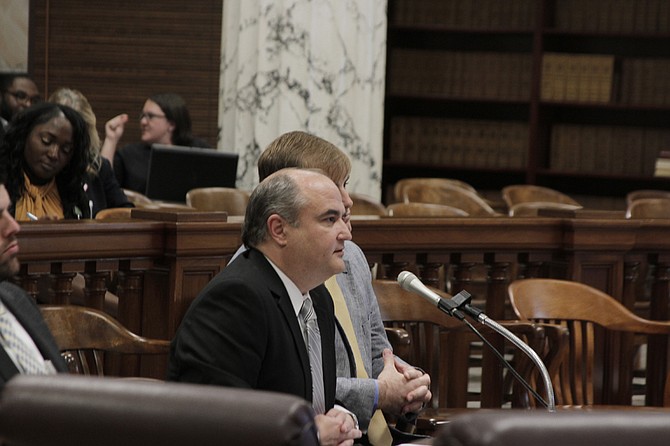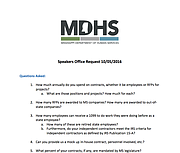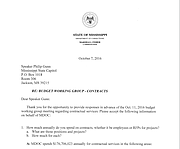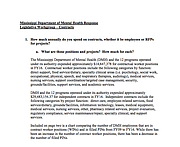John Davis, executive director of the Department of Human Services, told lawmakers that his department spends $75 million on contracts annually. Photo by Arielle Dreher.
JACKSON — Mississippi children living in poverty may be among the neediest in America, but last year the State of Mississippi did not allocate $35 million earmarked to help poor families in the state. That money sat on the table even as many children are on a long waiting list for services.
Last Wednesday, Rep. Jarvis Dortch, D-Jackson, pressed John Davis, the executive director of the Department of Human Services, on why he did not allow the Temporary Assistance for Needy Families, or TANF, funds to be spent, considering the waiting list of children who need child-care vouchers in the state.
Davis responded that TANF funds can roll over from year to year as long as the agency does not proportionally allocate the maintenance of effort funds for federal matching.
"So if we have a waiting list for child-care services, why aren't we spending the money on child care?" Dortch insisted.
Davis explained that he transferred the maximum amount of TANF funds he could through the federal child-care block grant, which issues vouchers to families who use TANF and need child care.
In order to use the leftover TANF money, Davis said he would have to create a separate program, and hasn't done that.
"I would have to actually start a separate child-care program to use those funds," Davis said last week. "I can't just funnel that through the child-care block grant."
Besides, he said, it's not enough, anyway. MDHS is currently spending $19 million of TANF funds on child care, but Davis said that even if he re-allocated those leftover TANF funds, there would still be a waiting list of children needing help.
"It doesn't matter how much we spend, there's always going to be a waiting list," Davis told lawmakers last week.
"We'll never have enough money to get people off the waiting list," he added.
MDHS emailed a statement to the Jackson Free Press when asked for further comment on the delay.
"The Mississippi Department of Human Services continues to look for opportunities to serve all child-care needs in Mississippi. We have been working with partners across the state to identify the best approach that will meet the new federal requirements provided through the Child Care Reauthorization Act. TANF funds as well as CCDF (Child Care Development Fund) will be utilized to the greatest extent possible to meet these goals," MDHS said.
Money Flowing Out of State
The red tape and delays of the child-care funds are indicative of larger problems Mississippi state agencies are facing. MDHS spends a total of $78 million in state money on contracts each year. But 94 percent of the department's total budget is made up with federal funding, Davis said.
Other state agencies cannot rely on that much federal funding and, thus, depend much more on state support, spending a large chunk of state dollars on contracts. MDHS does not spend the most on contracts, compared to other state agencies.
The Mississippi Department of Corrections spends $176 million on contracts annually, the majority of which are with out-of-state companies, emails provided to lawmakers on budget review committees show. State law mandates some contracts, but in MDOC's case, the Legislature only requires 27 percent of its contracts. MDOC is not alone in its high spending on contracts.
The Mississippi Department of Mental Health spends $44.13 million on contracts and contracted workers annually, but the number of contracted workers has increased significantly in the past few years. In 2009, the department only used 275 contracted workers; today it uses more than 1,000 contracted workers. Emails provided to lawmakers on the budget review committee show that this increase is not due to new legislation—but done out of necessity.
"Without the ability of the agency to contract for services such as medical and nursing services, DMH could not provide the needed treatment services to individuals with mental illness and intellectual/developmental disability as mandated by the Legislature," an email from DMH shows.
A Hunt for Transparency
Lawmakers in the budget hearing groups combed through long lists of agency contracts last week, looking for potential overlap in services. All agencies report their contracting data in the Transparency Mississippi portal, but lawmakers wanted more detail than those reports provided.
Rep. Becky Currie, R-Brookhaven, wanted department heads to explain the purpose of certain contracts, and asked that agencies provide follow-up information about what contractors listed as "consultants" are actually doing. Several agencies list contractors as "consultants" without explanation. The MDHS contractor list contains 30 "consultants," but it's unclear what services those consultants provide.
Rep. Brad Touchstone, R-Hattiesburg, asked Davis why the department had so many consultants.
"Are some or most of those consultants attached to the Olivia Y settlement?" Touchstone asked.
As a part of the Olivia Y consent decree, which came from a lawsuit filed against the state's foster-care system, MDHS had to contract with several outside companies and independent auditors to evaluate the state's foster-care system.
MDHS is still in the process of splitting from the new department of Child Protection Services, and some of the contracts stayed on MDHS' list due to their longevity. Davis said the majority of the consultant contractors were related to Olivia Y. MDHS has 126 contracts in total: 73 with Mississippi-based companies and 53 with out-of-state companies.
Lawmakers asked most state agency heads to provide more details about what exactly a "consultant" contract meant.
Marrying Public and Private
From the outset of budget hearings, Lt. Gov. Tate Reeves and House Speaker Philip Gunn, both Republicans, have said the working groups will prioritize what government should be paying for within certain departments and agencies and whether or not contracting will help.
"Should we privatize some of those expenditures? Is this agency performing a function that could better be done by the private sector?" Gunn said back in August.
In many cases, federal funding depends on the amount of State funding provided, often requiring a certain "match" to trigger the flow of federal dollars. Other federal funds are only available for specific purposes. The federal government provides funding to MDHS for tobacco-use prevention, for instance. The number of contracts and the actual contractors, however, are much more up to its leadership.
During budget hearings last week, lawmakers heard a presentation from the Reason Foundation, a libertarian think tank that encourages public-private partnerships, especially in government—and is popular among conservatives as a way to reduce the size of government even as critics say privatization can hurt service delivery.
Reason's presentation to lawmakers presented private competition as a panacea, though. "Virtually every service, function and activity has successfully been subjected to competition by a government somewhere around the world at some time," it promised.
Email state reporter Arielle Dreher at arielle@jacksonfreepress.com.







Comments
Use the comment form below to begin a discussion about this content.